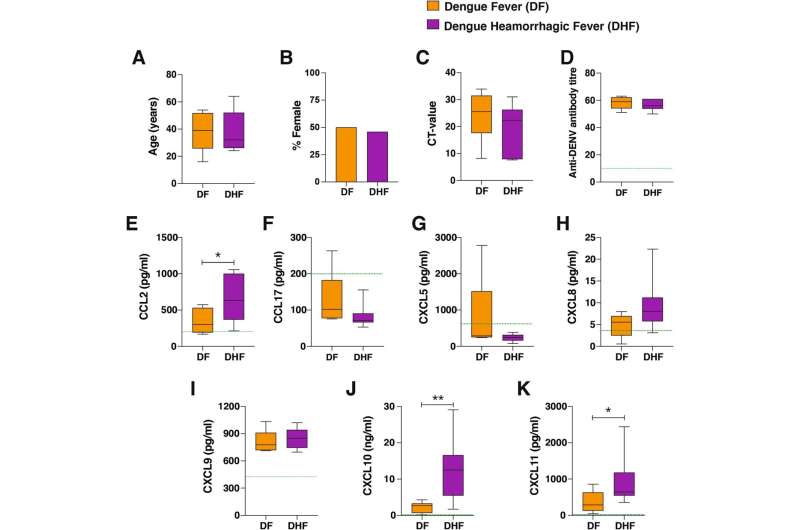This article has been reviewed according to Science X's editorial process and policies. Editors have highlighted the following attributes while ensuring the content's credibility:
fact-checked
trusted source
proofread
Discovery identifies those likely to experience life-threatening dengue fever

Scientists have discovered cell populations in blood that clearly indicate whether a person infected with dengue fever is likely to progress to life-threatening severe disease or not.
About half of the world's population is at risk of dengue fever, with almost 400 million annual cases. More will be at risk as global warming enables the spread of mosquito strains that carry the virus.
Until now, there has been no accurate way to predict which patients will progress to severe dengue fever. The new finding uses immune cells to grade potential severity, paving the way for improved patient management, health system savings, and the development of a biomarker test.
The international research team was led by Professor Diana Hansen at the Monash Biomedicine Discovery Institute, included WEHI in Melbourne, and Dr. Tedjo Sasmono at the Eijkman Center in Jakarta, Indonesia. Their work is published in the Journal of Biomedical Science.
Professor Hansen's team found that during a second dengue virus infection (secondary infections are usually more severe), one group of people had a T cell response which reduced its impact. "These type of immune system cells get called into action by what's called the adaptive immune system," she said. "That's a very targeted response, specific to the pathogen, helping you get less sick.
"The other group, who didn't have this specific response, have instead an innate immune system response, characterized by a strong inflammatory attack to control the virus. Those people get really sick, likely needing hospital care.
Professor Hansen said identifying the cell types and their subtypes wasn't easy. "It's a bit like trying to identify which particular fruit is causing a scent in a blended fruit salad," she said. "Is it the mango or the pineapple? We used a technique called mass cytometry, which tags cell types with rare earth metals, to identify specific cell types within complex blood samples, so we could 'unblend' the mix."
Health facilities in areas prone to dengue fever are often overwhelmed with patients who are admitted for observation. A non-fatal dengue hospital case costs an estimated US$1,400.
Professor Hansen's team is confident that the results will enable it to develop a biomarker test, like a COVID Rapid Antigen Test, for dengue fever. "This will enable doctors to triage patients at an early stage, instead of referring all those diagnosed with dengue virus disease on to hospital," she said.
"Dengue virus is one of tropical medicine's big challenges as there is no highly effective vaccine and no available treatment for severe cases. Reducing the cost of health care is particularly important for South East Asian countries which constitute 75% of the population exposed to dengue virus.
"We are beginning a second clinical study in an endemic area of Indonesia, to obtain more specificity in profiling particular cells predicting progression to severe dengue, to get a step closer to the development of a test for patients at the onset of fever."
Dr. Sasmono hopes this important work will strengthen regional research capacity. "The study brings together researchers and clinicians from Indonesia and Australia," Dr. Sasmono said. "This collaboration should be continued to further strengthen the capacity of biomedical researchers in both countries and the Asia-Pacific region."
More information: Lisa J. Ioannidis et al, Integrated systems immunology approach identifies impaired effector T cell memory responses as a feature of progression to severe dengue fever, Journal of Biomedical Science (2023). DOI: 10.1186/s12929-023-00916-4



















